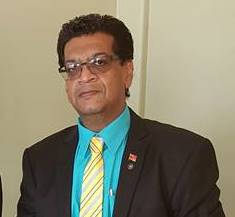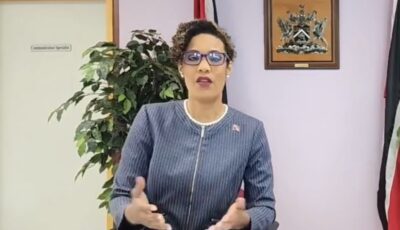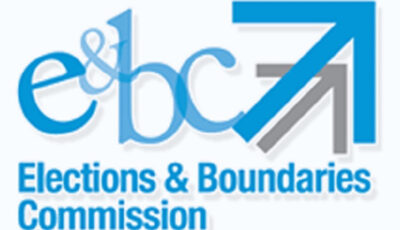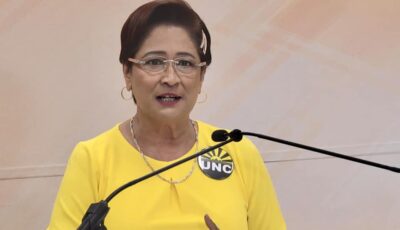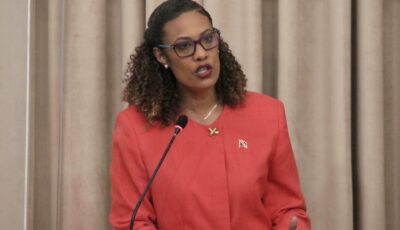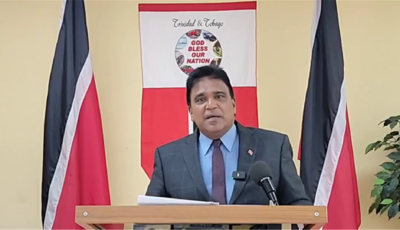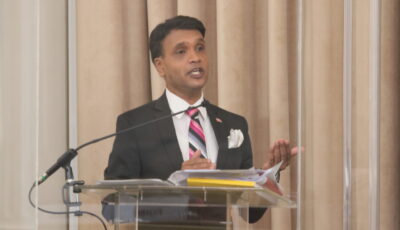Paray: Many Flaws in Whistle Blower Legislation
In Stalin’s Soviet Union, to justify oppression, the State needed enemies. And If they did not exist, they had to be invented.
Stalin created a system OF informers where anyone could be accused and convicted of crimes they knew nothing about. Ordinary people who expressed criticism of the state found themselves hauled before the courts charged and sentenced without ever knowing what crime they were supposed to have committed.
Between 1935 and 1940, Soviet courts convicted 102,000 children of petty crimes. All because Stalin needed convenient enemies.
The Governments’ WHISTLE BLOWER legislation has little to do with weeding out corruption, and all to do with creating convenient enemies.
As it currently stands this bill is about creating a paranoid culture where everyone is in fear of being accused of crimes and where merely being suspected of crimes is as good as being convicted of crimes.
The government have selected 21 agencies and institutions to establish a whistle blowing reporting unit. But they have given no specifics about how this will be implemented.
Who appoints this unit? Who appoints the director? On what terms and conditions? There is an absence of supporting REGULATIONS which should speak to the framework of the law.
What is the qualification of a director or reporting officer? How does one determine what makes a good and competent person for this very important position and what safeguards are there to ensure that the office of a reporting officer is not itself corrupted?
What is stopping the government from appointing politically biased persons who will be there to serve political interests.
There is a danger , that far from exposing wrongdoing, this legislation may provide the avenue for the state to clamp down on genuine whistle-blowers.
It also opens the door to the dangerous possibility of state actors fabricating evidence against persons and then using the veil of “Whistle blowing” as a means to lend it legitimacy.
PRIVATE SECTOR RESPONSIBILITY
This law , at face value, will require 76,000 companies and 500 state enterprises to come up with their own internal procedures to receive whistle-blowers. While the AG speaks to the Whistle Blower Officer ( WBO) and the Whistle Blowing UNit (WBU) as not being mandatory ( since private sector whistle blowers can access any one of the 21 State WBU) the law says differently. The law as written, differs from the AG ‘s view.
Section 2 ,Clause 11.1, 12.1, 12.2, 12.3, 13.1, and 13.3 uses the word SHALL, consistently referring to the obligations of the employer for INTERNAL DISCLOSURES.
While I understand the linkage between some PRIVATE SECTOR companies and the STATE , the AG could have simply made it mandatory for all private companies desirous for qualification of STATE ENTERPRISE PROJECTS.
These companies should have a WBU and a WBO registered with the state and governed by legislative regulations.
So on the one hand, the AG is saying that in the event your private sector employer is not in conformity with the requirement, don’ t worry, you can rely on the state. But the LAW tells PRIVATE SECTOR EMPLOYERS that they MUST/SHALL comply. If that is so, what are the penalties for refusing to comply.
This is simply increased regulatory burdens at a time when business across T&T are struggling, and on the verge of collapse, due to the hostile business climate imposed by this government. There has been no research as to the additional cost and how it will affect small and micro enterprises.
STATE ATTITUDE TOWARD WHISTLE BLOWERS :
We have seen how whistle-blowers are treated by this government: An employee of the Ministry of Sport, blew the whistle on a high ranking public officer of the state. Where is that report? Why is the state using non disclosure agreements in matters involving the use of Tax payer money? Is she still working ? Has she been terminated? Has she been able to find a job? Is she being discriminated against?
The General Manager of the Port Authority in 2017, after she testified before a JSC on the procurement and maintenance of ferries for the inter-island service, Where is she today?
The General Manager of PTSC warned the people than when they go before a JSC that they cannot be factual or truthful otherwise you will end up on the breadline.
Could you imagine a general manager of a state enterprise telling the country, “Do not do like me, do not tell the truth before a JSC, you could be on the breadline”.
Unfortunately, the people of Trinidad and Tobago has little faith and trust in State Agencies, ….just ask Ian Alleyne.
POSITION OF THE CHIEF PARLIAMENTARY COUNSEL:
The Chief Parliamentary Counsel referenced the issue of privacy rights. His advice was,
“The Bill, therefore, needs to be passed with a special majority”—which we
have—“in accordance with section 13(2) of the Constitution.
It is arguable, however, that even if the Bill is passed with such a special majority, it may still be unconstitutional under section 13(1) of the Constitution on the grounds that it is not reasonably justifiable in a society that has proper respect for the rule of law…”
– THIS IS THE INSTRUCTIVE SENTENCE :
“That even if the Bill is passed with such a special majority, it may still be unconstitutional under section 13(1) of the Constitution”. This is what the Chief Parliamentary Counsel tells us. I am sure the CPC is not a member of the UNC.
WHISTLE BLOWER – CONTRADICTION WITH CYBER CRIME LEGISLATION.
This Bill is in a fundamental contradiction to the Government’s Cyber crime Bill. Whistle-blowers today can rely on passing information to the media. But the cyber crime Bill explicitly criminalizes the distribution of incriminating information that a whistle blower might have obtained and passed on to a journalist.
While the Whistle bower bill is making it dangerous for persons to be the victims of planted evidence, the cyber crime is bill is making it illegal for genuine whistle-blower to pass on evidence to journalists.
One can easily surmise that the government is trying to restrict genuine whistle-blowers while trying to muzzle journalists.
In the whistle-blower bill, protection is afforded to disclosures made by whistle-blowers in the public interest in order to combat corruption and improper conduct. This is allowed for internal disclosures but also external disclosures, specifically to a whistle-blowing unit as identified in Clause 15.
What this does is limit the protection of disclosures to within the corporate or Government structure.
In a situation where this process has failed the whistle-blower or where the whistle-blower has reason to distrust the process, but feels it is his/her duty to make public certain disclosures, then the whistle-blower is trapped by Clause 8 of the proposed cyber crime legislation, which “seeks to create the offence of receiving or gaining access to computer data, knowing that it is obtained illegally, and would carry the same penalty as that of the offence of illegally acquiring computer data.”
The example I can think of here is a junior staff member coming across a document during their work which points to misconduct. The document is discovered on a senior manager’s computer, as these things go, if they attempt to print or forward or copy this document, is it then illegally obtained?
The fact is whistle-blowers today have a choice on who to disclose information to and by offering protection, only within the corporate or government structure, it then de-legitimizes the existing option of going to a journalist or someone else outside of that limitation whom they believe is trustworthy.
And if the point of this legislation is to combat corruption, shouldn’t there be a Clause that gives them protection in other circumstances as well?
People generally do not trust government institutions and the media provides an outlet for disclosure which have been ignored by the people or officers who will be charged with the responsibility of responding.
And while there may be many reasons to explain the failure to protect whistle-blowers who turn to the media, it is inconsistent to use one Bill to protect them while the other Bill is going to be used to criminalize them in trying to achieve the same outcome, which is unveiling and reporting misconduct.
CONCLUSION :
This bill is poorly designed and will not achieve its intended purpose, other than that of perpetuating political mischief.
It is because of this, I am unable to lend any support to the bill as it stands in this format.
The role of the Opposition is to seek out the mischief in Legislation and work towards making better law. As we have done in the past, we have encouraged the government to fix laws with appropriate amendments.
This BILL was still-born, as it was ripped apart prematurely from the JSC without consultation from stakeholders and the Independent Bench. I recommend that the Bill be allowed to be sent back to the JSC and allow the Independent Bench and the 40 odd stakeholders to have its say.
I understand the Government’s Love / Hate relationship with the Opposition when it suits them, but to disregard the voice of the Public and that of the President was a dereliction of duty by the Prime Minister himself, who admitted, that it was his instruction to bring this tattered piece of legislation to Parliament.
The continued action of trampling on the Constitution continues to go unbridled by the Government.
The government continues to run roughshod over the constitution. This government wants to tear apart the rights of citizens in this country. They want to turn us into a police state where we no longer enjoy the fundamental rights as a citizen!!!
I do agree with at least one thing the AG had to say. The People will judge us at the end of the day and I am prepared to stand by the position of the Opposition .
This is my view and you don’t have to agree with it.
The Hon Rushton Paray
Member of Parliament, Mayaro

